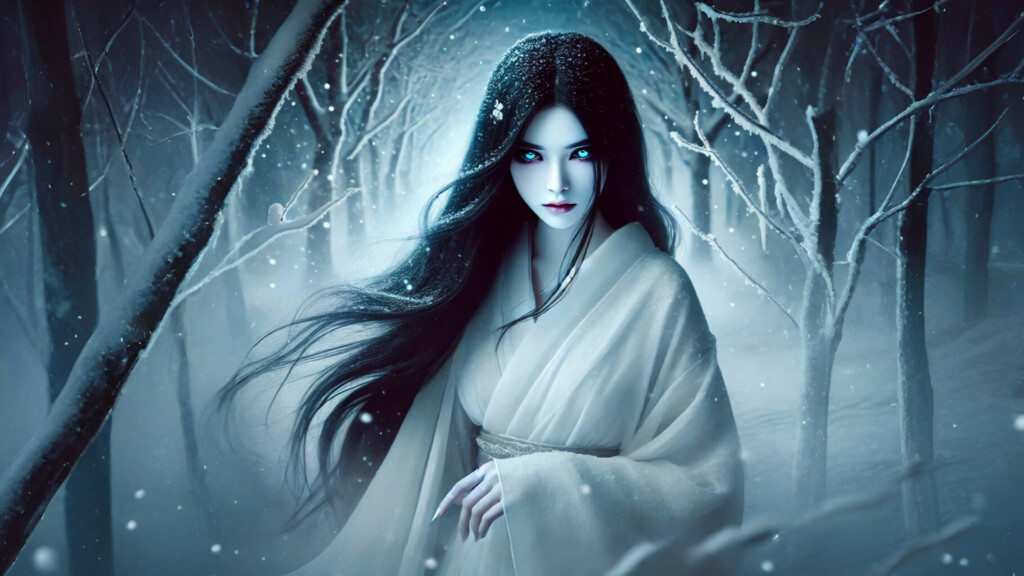Winter in Japan brings not only bone-chilling winds and snow-covered forests but also eerie mysteries. On nights when the snow falls thickly, shrouding the world in an ethereal white, whispers tell of a woman in a flowing white kimono gliding soundlessly through the snow. She is as beautiful as a dream, but those who see her rarely return. She is Yuki-onna—the Snow Woman, a ghost of winter.

The Origins of Yuki-onna
In Sougi Shokoku Monogatari, written by the monk Sougi during the Muromachi period (1333–1573), Yuki-onna (雪女 – “Snow Woman”) appears on bitterly cold winter nights when the world is blanketed in snow. She is depicted as a woman of breathtaking beauty, with skin as pale as snow, long black hair that trails to the ground, and deep, mesmerizing eyes—both enchanting and terrifying. She wears a thin, white kimono, or sometimes appears as nothing more than mist and snow, as if she herself is the embodiment of winter’s cruel embrace.
The Legend of Yuki-onna
One of the most famous versions of Yuki-onna’s tale appears in Kwaidan, a collection of ghost stories by Lafcadio Hearn. It tells the story of Minokichi, a young woodcutter, and his elderly master Mosaku, who become trapped in a snowstorm while traveling through the forest. They seek shelter in a small abandoned hut.
That night, a woman dressed in a white kimono silently enters. She exhales a freezing breath upon Mosaku, instantly killing him. But when she turns to Minokichi, she hesitates, gazing at him for a long moment before whispering:
“Because you are fair of face, I shall spare you—but only if you never speak of this to anyone.”
Years pass, and Minokichi meets and marries a beautiful woman named Oyuki, whose name itself means “snow.” They have children and live happily together.
One night, as he watches Oyuki under the lantern’s glow, Minokichi is suddenly reminded of the Snow Woman he encountered long ago. He tells his wife the story.
Oyuki falls silent for a long time before softly saying:
“That woman was me. I warned you never to speak of it, but for the sake of our children, I will not harm you. Take good care of them.”
With that, Oyuki vanishes into the air, like snow melting in the wind.
In other versions of the legend, Yuki-onna is said to have once been a princess of the Moon, trapped in the human world after descending to admire the Earth. On nights when snow falls beneath the full moon, she appears again, searching for a way home.
Some tales tell of her testing the hearts of those she encounters. If offered cold water, she swells with power. But if given warm water, she vanishes into nothingness.
The Meaning of Yuki-onna
No matter the version, Yuki-onna represents something both beautiful and fleeting. She is more than just a ghost gliding through the snow—she is a symbol of the untouchable mysteries of the world, where beauty and death intertwine in a sorrowful dance.
In Minokichi’s whispered confession, she becomes a forbidden secret—an unspoken promise that, once broken, leads to disappearance. She melts away, leaving behind a sharp lesson: some things are better left unknown.
But when she is the lost moon princess, Yuki-onna’s sorrow is different—her long black hair flowing like an unfulfilled yearning, reaching toward the heavens, yet forever imprisoned in the frozen grasp of the mortal world.
Then, there is her trial of hot and cold water—growing stronger or dissolving away depending on how she is treated. This is a delicate message: nature survives only when treated with care.
Whether she is a guardian of secrets, a lonely spirit, or a merciless test of fate, Yuki-onna shares echoes of Snegurochka and Skadi—beautiful, dangerous, and never meant to last. Her story, laced with chilling yet hypnotic words—”vanish,” “cold,” “fragile”—draws readers into a frozen dream. She is winter itself, the distance between reality and illusion, a reminder that the most mysterious things often disappear like snow in the wind.
In every version of her legend, Yuki-onna’s fate is always to disappear. But how she disappears is what truly matters—whether as the cost of broken trust, the sorrow of a lonely soul, or a trial for those who dare to face her.
